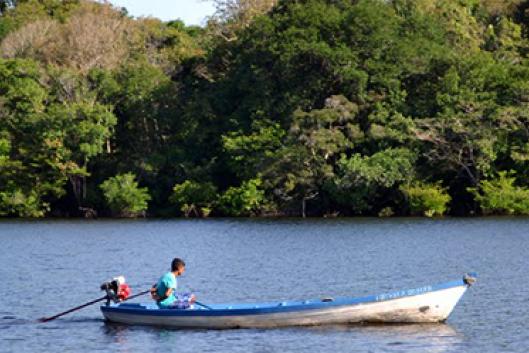The carbon credit market, a mechanism of the so-called "green economy", has been under debate in Brazil for about a decade, and there are many concerns and varying perspectives on this issue. Governments and companies currently see the mechanism as a possible way to generate financial return. Meanwhile, traditional communities are concerned that the mechanism, among other risks, could expose them to loss of their rights and territorial security. For this reason, communities and leaders from the Tapajós Arapiuns Extractive Reserve (RESEX) – together with social movements from the neighboring city of Santarém, in the state of Pará in the Amazonian region of Brazil – have opposed a forest carbon demonstration project proposed by ICMBio. ICMBio is the government body responsible for managing Conservation Units, including RESEX. RESEX is a category of Conservation Unit that allows people who inhabit and depend on forests to use them sustainably.
The RESEX Tapajós Arapiuns carbon credit project first came up at a Conservation Unit Advisory Board meeting in July 2014, and the issue was again addressed at subsequent Board meetings. However, a significant portion of the RESEX population only became aware of the discussion in early 2015, after hearing some board members' concerns about the lack of understanding of the issue and its complexity. According to the minutes from the board meeting that took place in the community of Vila Franca, these members requested further clarification on the issue; at that time, the information available was that ICMBio planned to develop a pilot “Forest Carbon” project in RESEX.
For this reason, the community of Surucuá held a workshop on March 28, 2015 to better understand REDD project methodologies. The workshop was organized by concerned community leaders who wanted to better understand the issue. Residents of the villages of Pajurá, Paricatuba, Vila de Amorim, Muratuba, Aldeia São Pedro, Retiro and Mangal also participated, along with members of social movements from Santarém, who contributed to the discussion by providing information. At that meeting, community members identified several needs, and demands to broaden the discussion to include other RESEX inhabitants. Among their demands were that other workshops with the same content be held in other communities, that the Board of Directors of the Tapajós-Arapiuns Extractive Reserve Associations (TAPAJOARA) actively participate in said meetings, and that strategies be in place to guarantee the participation of RESEX inhabitants in a transparent public consultation process.
Later, the Rural Farm Workers and Family Farmers Union (STTR) of Santarém held a workshop on June 8, 2015 with main RESEX leaders to clarify questions and concerns. The workshop was coordinated by the Federation of Social and Educational Assistance Organizations – FASE Amazonia – and by academic Marcela Vecchione of the group “Carta de Belem”, with the support of the human rights organization Terra de Direitos. On that occasion, RESEX inhabitants' main concerns and questions were clarified. At this meeting, a representative from the indigenous community of Aningalzinho handed the President of STTR Santarém a signed declaration stating the community's opposition to the forest carbon project in RESEX.
Following that meeting, an alternative discussion group formed to oppose the proposal. The group comprised representatives of STTR-Santarém, Terra de Direitos, FASE, Pastorais Sociais, [the Social Pastoral] Comissão Pastoral da Terra [Pastoral Land Commission] (CPT), TAPAJOARA, the National Council of Extractive Populations (CNS), Community Action Project Support Center (CEAPAC) and RESEX leaders. Simultaneously, the indigenous movement was discussing the issue with great concern, as they had received news and alerts about other projects being implemented on indigenous lands, which potentially threatened their autonomy.
On August 4, 2015, ICMBio held a meeting with all organizations that were part of the group, organizations with activities in RESEX, and the Federal Public Ministry. The Ministry suggested that discussions be renewed with strong participation of RESEX inhabitants, and everyone agreed. The meeting highlighted the needs for the project to comply with all applicable international protocols; for it to respect the constitutional, statutory and customary rights associated with land ownership; for occupied lands to receive official titles; for local communities to be represented; and for the rights of indigenous communities and small landholders to use natural resources. Moreover, the meeting stressed the need for full compliance with the United Nations Declaration on the Rights of Indigenous Peoples and the International Labor Organization Convention 169.
On August 11th, ICMBio held a meeting at STTR headquarters in Santarém with Brazilian company Biofílica, the company responsible for developing the project – which, according to their webpage, “aims to market environmental services.” Their strategy was to convince participants that the project was necessary in order to make implementation of RESEX's Management Plan programs and subprograms financially viable.
On August 13th, the indigenous movement occupied ICMBio's headquarters in Santarém with several demands, the principal one being cancellation of the carbon project. As an immediate result of this movement and after much negotiation, ICMBio National temporarily suspended discussions until further clarification took place. The movements continue being alert and oppose implementation of the project. They argue that this kind of project is not really aimed at solving the global environmental crisis, as it threatens the autonomy and territorial security of traditional communities who live and coexist in harmony with the best preserved places on the planet. They also assert that another kind of human development is possible, outside of the financial perspective and market logic.
Mayá Regina Müller Schwade, mayaschwade@gmail.com
Guillermo Antonio Cardona Grisales, gcardonasj.mao@gmail.com
Angelo Ricardo Sousa Chaves, achaves.natural@gmail.com
